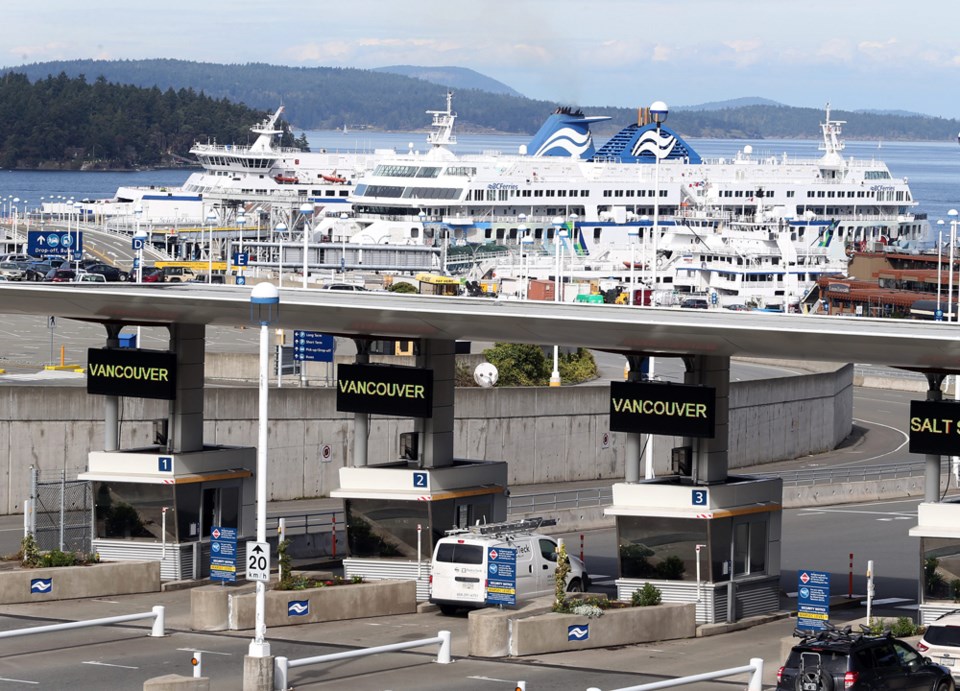On the busy Remembrance Day long weekend there was one Tsawwassen-Swartz Bay ferry sailing that had 50 unredeemed reservations.
It’s one of the reasons why B.C. Ferries is planning “variable-priced fares” for its three major routes between Vancouver Island and the Lower Mainland.
“We might offer variable pricing if you book a discounted fare at our off-peak time and fully prepaid for that,” said B.C. Ferries spokeswoman Deborah Marshall. “And then this issue of no-shows will certainly be a lot less frequent than it is now.”
The changes are to be introduced in the spring and B.C. Ferries hopes they will help to balance out sailing loads.
“While some [fares] may be a little bit more, that allows us to offer a discount so we balance out,” Marshall said. “The less popular sailings would be cheaper, for example. If we can attract customers to travel at a less popular times, if they are more flexible with their travel times, that would generally free up more popular times. It’s demand management.”
However, the drive-up or standard rate will not vary depending on time of day and day of week, Marshall said.
“This will not be ‘surge’ pricing where the cost increases as inventory is reduced.”
“What we’ve been finding is customers are booking multiple reservations — we assume because they are cheaper than they used to be,” said Marshall. “They may not know exactly what sailing they want to travel on so they might book the 1 p.m. and 2 p.m. sailing. They’ll show up for one and they won’t cancel the second one.”
Currently, reservations cost $10 if booked more than seven days in advance, $17 if less than seven days, and $21 for same-day.
In the spring, reservation fees were reduced to $10 from $15 for customers booking at least a week in advance — part of $78 million in fare reductions as part of an agreement between the ferry corporation and the B.C. government to make ferry travel more affordable.
“If they prepay their fare in full, they will be less likely to no-show,” said Marshall. “Right now, $10 is proving not to be an incentive to cancel.”
B.C. Ferries is obliged to keep a reservation until 30 minutes prior to sailing; only then is it able to open up the space.
“Because we have that [uncancelled] reservation in our system when you look at our website it will have that reservation included,” said Marshall. “It artificially inflates the wait times for standby traffic.”
As B.C. Ferries traffic has increased over the past several years, customers have been booking more reservations.
“Five years ago you could look on the website on the Tsawwassen-Swartz Bay run and there was always space available and now you look and the reservations are fully subscribed already,” said Marshall.
The amount of reservable spaces varies between 45 per cent and 75 per cent depending on factors including the sailing time, size of vessel, and ratio of expected commercial vehicles versus private cars.
“The reservation, it would all be rolled in, you wouldn’t be paying a separate reservation fee and it wouldn’t be as high as $21,” said Marshall. “The farther you book in advance, the more opportunity there would be for the variable pricing,” said Marshall.
Last year, B.C. Ferries carried its largest number of passengers since 2008, and more vehicles than any year since 2010.
Reservation fees brought in $18 million for the corporation, which had total revenue of $859 million in 2017.
“We will be rolling out a new pricing structure next year and we’re still working out the details,” said Marshall. “We plan to seek customer feedback as we roll out the new structure.”



